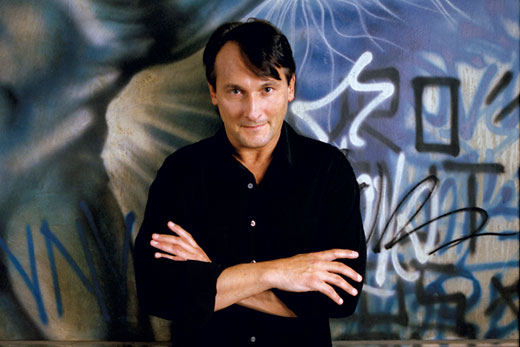Christopher O'Riley, known as the popular host on NPR's classical music program, "From the Top," stretches classical piano beyond conventional boundaries. Along with interpreting the classical canon, he transcribes and performs alternative rock. His repertoire has included Radiohead, R.E.M., Portishead, Cocteau Twins, Pink Floyd, Nirvana, The Smiths, Tears for Fears and Elliott Smith.
Performing at the Schwartz Center on March 2, O'Riley shares insights about his creative process and the upcoming Emory concert:
Why Radiohead? What leads you to transcribe a particular piece?
The more interesting the original's texture, the more compelling the harmony, the easier it is for me to make my way into the spirit of the piece. I also tend to end up with something nearly unplayable, and after mastering it and proving it technically feasible, proceed to make the next one more challenging.
Last year you recorded "Shuffle.Play.Listen" with cellist Matt Haimovitz, a 2-CD juxtaposition of 20th century classics by Stravinsky, Janácek, Martinu, Piazzolla and Bernard Hermann, with pop such as Arcade Fire. What was it like arranging for the cello and working with Matt?
Matt has been a joy to work with. Our initial meeting was to prepare for a concert in Billings, Mont., just over a year ago. Eight to 10-hour rehearsal days went by effortlessly and pleasurably. So the hothouse atmosphere of coming up with more than 80 minutes of arranged material in a four-month time frame was, if anything, abetted by Matt's continual dedication and intuition as to how to address and rethink the limits of virtuoso cello technique. It was like watching the discovery of fire.
What do you feel are the similarities and differences between performing pop and classical?
There's really more similarity than contrast, but counterintuitively: When I recorded "True Love Waits," my first arrangements record of Radiohead, I remember listening to rough takes, some of which were discernibly concerned with maintaining and generating the kind of pulse and beat that I found exciting in the original. Others were, as in a Chopin piece, primarily focused on the shaping, the phrasing of the melody, and seemingly unconcerned with pulse. Those were the takes we went with, and which treatment I have come to be wholly convinced is the best for all the music I play.
"From the Top" shares the stories and performances of talented young musicians, ages 8 to 18. Are you seeing the boundaries between classical and rock dissolving with this generation?
Young musicians explore much more widely in their genre-choices, mostly for pleasure, and, as a result of the compelling quality and integrity and beauty of some of those found musical kindred spirits, they may choose to embrace a broader repertoire.
You will announce the March 2 program from the stage. Any hints for what the Emory audience can expect?
I'm doing a Liszt record in March, all arrangements of his; Berlioz's "Symphonie Fantastique," the Don Juan Fantasy based on Mozart, a mash-up of arrangements by Liszt, Moskowski and myself of Wagner's Prelude and Liebestod from (the opera) "Tristan und Isolde," some song transcriptions of Schubert and Schumann, my suite from 2011 Centenary-celebrated film composer Bernard Herrmann's score to Alfred Hitchcock's "Psycho," some newer Radiohead, a brand new piece I did based on jazz trumpeter Jon Hassell's "Last Night the Moon Came Dropping Its Clothes in the Street," and of course, some R.E.M., "It Happened Today."

